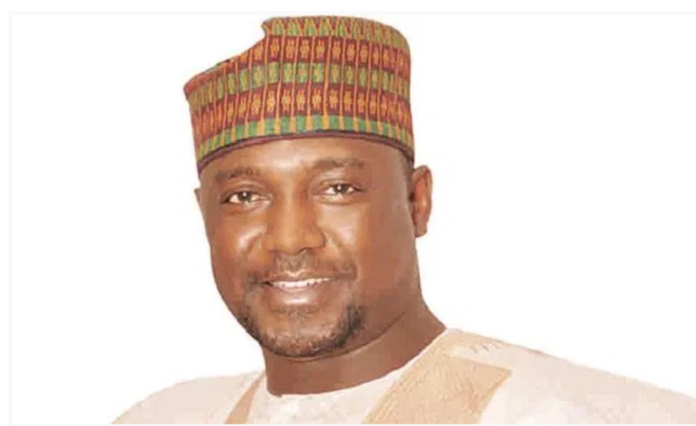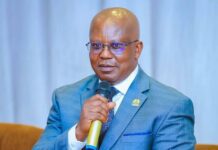Governor of Niger State, HE, Abubakar Sani Bello.
By Abasifreke Effiong
Every Wednesday, more than 1,000 yam farmers converge on Ishau market to sell tonnes of yam harvested from their farms. The yam market in Ishau district, Paikoro local government area, is the biggest yam market in Niger, one of Nigeria’s North – Central states.
On the Ishau market day, revenue agents working for Paikoro local government council collect at least N1milion as toll from the yam sellers. Ishau yam market has remained one of the biggest revenue points for Paikoro local government council.
The Ishau yam market has been of immense economic importance to Paikoro local government council, the government of Niger state and the people of Niger. Sadly, the market and its host community have been neglected by government. Traders are bitten by the miseries of bad roads leading to the Ishau yam market. Some traders have stopped trading at the market. Transport fare to the market has gotten way too high for because of the terribly dilapidated roads.
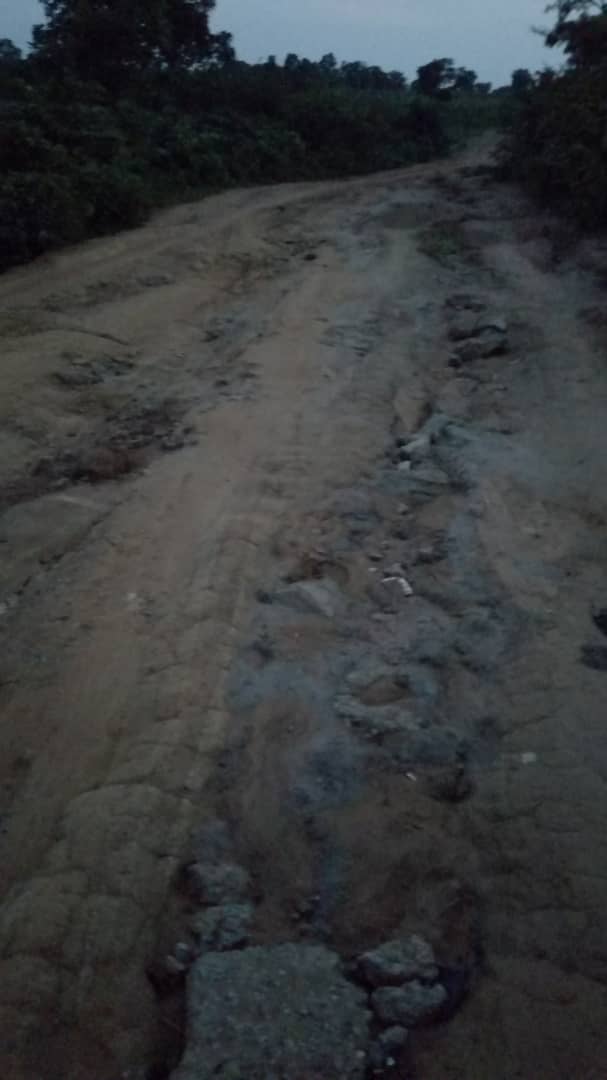 Photo of the road leading to the yam market in Ishau, Paikoro local government, Niger state.
Photo of the road leading to the yam market in Ishau, Paikoro local government, Niger state.
The village head of Ishau district, Chief James Kwasau, said cars can no longer access the market, hence motorcyclists are charging traders ten times higher in fares than motorists were charging.
“The state of the road is deteriorating now that the rain has started. The road is too bad. By August we may not be having an access road to the village.”
“Our occupation is farming; now it is difficult to transport our produce to the market. We are using bikes. The road is very bad, from Kabun Koro to Ishau is a very bad one. Before we used to pay N300 as transport from Kabun Koro to Ishau. Now bikes are charging N1500. It is very hard for big cars to drive on the road”, Kwasau narrated.
READ : Staff of BEDC injured by illegal task force working for BM in Ughelli
The dilapidated roads have seriously slowed down rural commerce in the 18 communities in Ishau district and the profits of micro and small scale farmers and other businesses in the district have also dipped because of high cost of transportation.
“The road don spoil. Where Okada suppose collect N50, they will collect N500. If you have small load, Whalli , you will pay up to N2000. There is a culvert on the road leading to the market, that is at Amale village. The culvert is totally condemned, motor no dey fit pass there again. If you go there you will see water rushing there. Car no dey follow the road now”, Hon Usman Barwa, councillor representing Ishau ward said.
Barwa said he has personally drawn the attention of Paikoro local government chairman, Mr Yohanna Yakubu, to the dilapidated road and the threat it poses to residents and businesses.
“I don lay complaint tire. I lay complaint to my chairman. I talked to chairman, he said he cannot do anything until he gets approval from His Excellency, because it is a state road.”
The district head of Ishau district corroborated that the community has made frantic efforts to draw the attention of the governor, HE Abubakar Bello, to the very bad road network in the district and how it is causing restiveness among farmers, traders and youths.
“We have been writing to the government, to His Excellency the governor, but there has been no response. We have even written to the governor through the Emir of Minna, but no response. There was a time the governor tried to bring a grader to grade the road from Adunu to Ishau, but some youth said they don’t want grading. They demanded that government should reconstruct the road.”
 Advertisement.
Advertisement.
The district head said that earlier this year, youths blocked the road and attempted to stop the collection of levies at the Ishau yam market in anger that the community is neglected despite that its yam market is a big revenue point to government. Leadership of the community had to intervene and appeal to the youths, with a promissory that government would fix the road as part of its 2020 capital project. Five months after Chief Kwasau, hoped that government would intervene on the road there is no hope at sight. Kwasau is now living in fear of a possible attack from the youths.
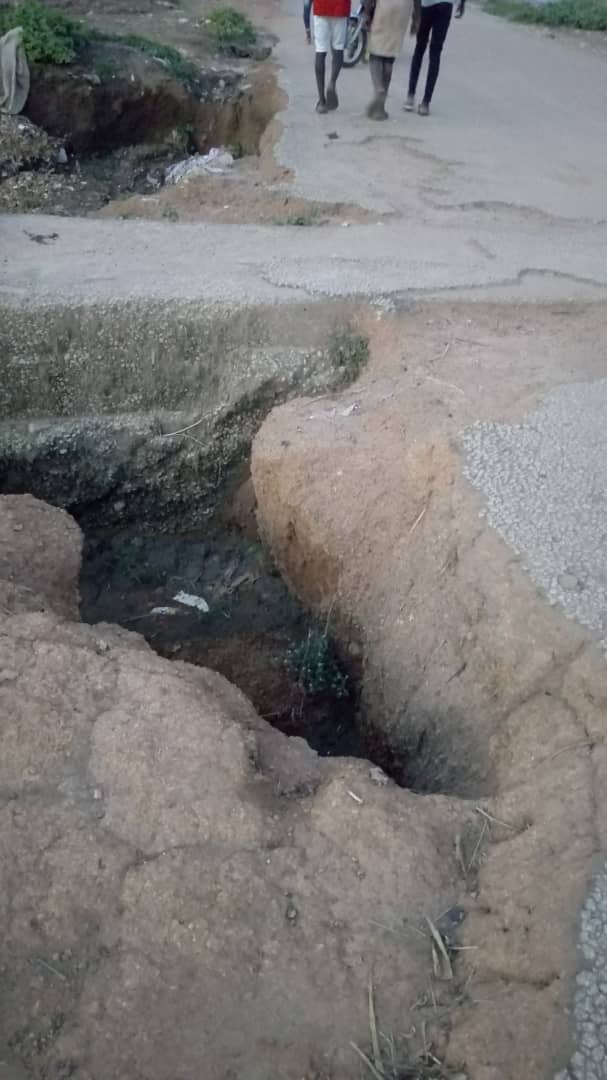 A portion of the bad road in Ishau.
A portion of the bad road in Ishau.
Niger state has produced two Heads of State. The eighth Head of State, General Ibrahim Babangida and, the 11th Head of State, General Abdulsalami Abubakar, are both from Niger state. However, basic infrastructure and amenities are still a profound challenge in many communities especially, in the three Christians dominated areas, Ishau district, Adunu district and Kasin Koro.
Babangida and Abubakar are both from Minna, where Muslims are in the majority. Babangida was Nigeria’s Head of State from 27th August 1985 to 26th August 1993. His legacies include, the Structural Adjustment Programme (SAP) made to cushion the 1983 and 85 economic crisis, construction of the third mainland bridge – the largest in the continent at the time, completion of dualisation of Kaduna-Kano highway and Shiroro hydroelectric power station as well as the creation of DSS, NIA, DIA, FRSC, Nigeria Security and Civil Defence Corps, Federal Environmental Protection Agency and Oil Mineral Producing Area Development Commission. Abubakar who was Head of State from June 1998 to May 1999. He has to his credit the establishment of the Independent National Electoral Commission, INEC, and the National Examination Council, NECO.
Often, visitors to Niger state particularly an area like Ishau district where bad roads and non-availability of electricity are major challenges, form a perception that the two torchbearers from the state, who led the country ‘when things were much better’, did almost nothing for the people. It is difficult to convince people who have not travelled the length and breadth of the state that some communities in the power state are still without electric poles in 2020; despite hosting Nigeria’s biggest hydroelectric power project, the Kainji dam electricity project. The Kainji hydroelectric dam which was to generate 960MW of electricity cost Nigeria a whooping $209million in 1968, equivalent of $1.3billion in 2018. The hydroelectric dam had eight turbines and covered a stretch of 7.2km long. This multi-billion dollar project stands merely as a monument. Communities in the state still do not have electricity. There are no electricity polls in some of the communities in Ishau district.
Most of the infrastructure provided during the military regime are fast decaying. Example is the Ishau road which was constructed by H.E, David Mark, who was military governor of Niger state from 1989 to 1990.
“Since the roads were constructed by David Mark, no interventions have been done”, a youth leader in the district said.
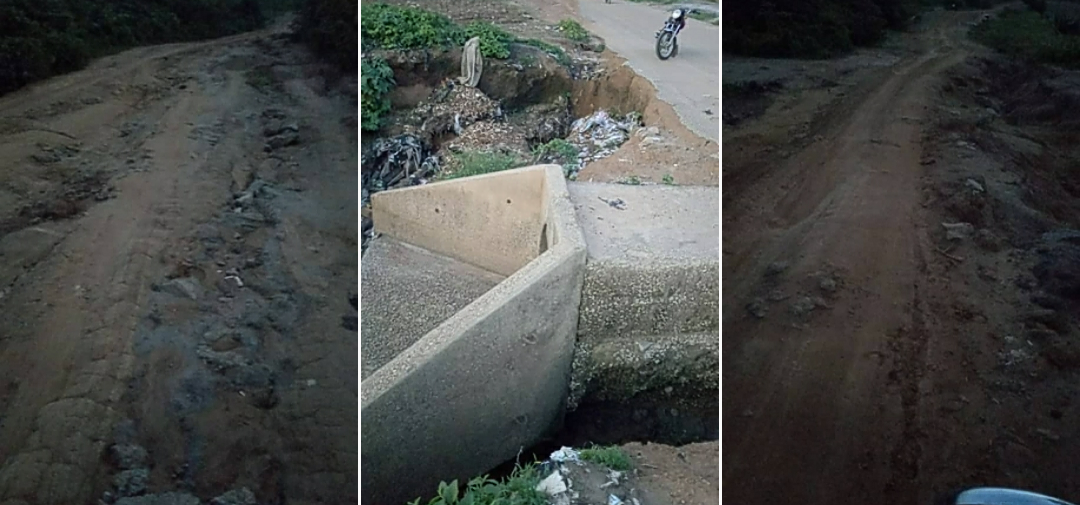 David Mark constructed this road as military governor of Niger state, now it has been dilapidated.
David Mark constructed this road as military governor of Niger state, now it has been dilapidated.
Poor infrastructure is not akin to Ishau. Recently, corps members posted to Niger state cried out to management of the NYSC over the deplorable state of facilities at the NYSC permanent orientation camp, at former Abubakar Dada Senior Secondary school, Paiko. A corps member posted to the state, Mustapha Jalingo, was quoted as describing the Niger state NYSC camp as ‘the worst place for human habitation.’
Jalingo reportedly said, ‘with what we see in the camp, it is clear that the state government is insensitive to the plight of corps members posted to the state.
Niger State orientation camp looks like the worst refugee camp you can think of; in fact, they brought us here to suffer us for nothing. If the state government is not ready to do the needful, the NYSC should redeploy us to another state.” The decrepit infrastructure there prompted corps members to call on the NYSC to stop posting corps members to Niger until the state government is able to provide a camp that is habitable.
Niger State is also facing serious security challenges, notably, cattle rustling, kidnapping, highway robbery and youth restiveness. About 100 people have been kidnapped in the state between December 2019 and July 1, 2020. In December 2019, gunmen abducted eight workers including two foreign nationals working for a construction company around Shiroro- Galadima. In January 2020, gunmen killed 11, kidnap four women in Kudodo, Galapai, Dnakpala Makera and Dnalgwa communities . On February 2nd 2020, Victoria Barwa, Dorcas John Barwa and her one year old daughter and Justina Usman Barwa and her two years old son were kidnapped from their house in Ishau community and were kept for more than a month by their abductors. Elsewhere that same month, a Imam and 19 others were kidnapped at the palace of Emir of Bogu. In March, bandits kidnapped five school girls, their teacher and security guard in Maruba, Mariga local government. In May, gunmen killed 1, kidnapped nine people including a six months old child in Kagara, headquarters of Rafi local government area.
RELATED STORY : No hope for children, women abducted in Ishau, Niger state, 22 days after
Poor infrastructure and insecurity are big issues which have overwhelmed the Governor Abubakar Bello, led administration in Niger state. The police have tried, but they are becoming helpless as more and more people are kidnapped. The effort of the police to get at these bandits is frustrated by poor road network in many communities. Everyone is helpless. People are getting angry and feeling frustrated by the challenges they face on daily basis. Niger State needs urgent help. It is the wish of everyone that the recent resolution where the Senate called for the establishment of a permanent military base at the boundary between Alawa and Uregi areas of Shiroro and Rafi local government areas and other drastic actions suggested by the senator representing Niger East senatorial district, Senator Mohammed Musa, will bring an end or at least reduce acts of banditry and kidnapping in Niger state.



